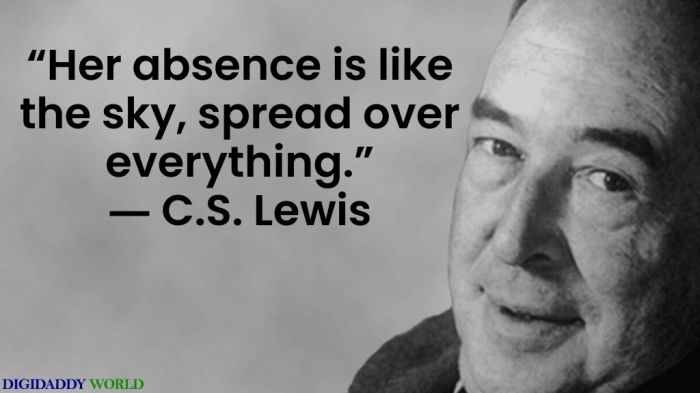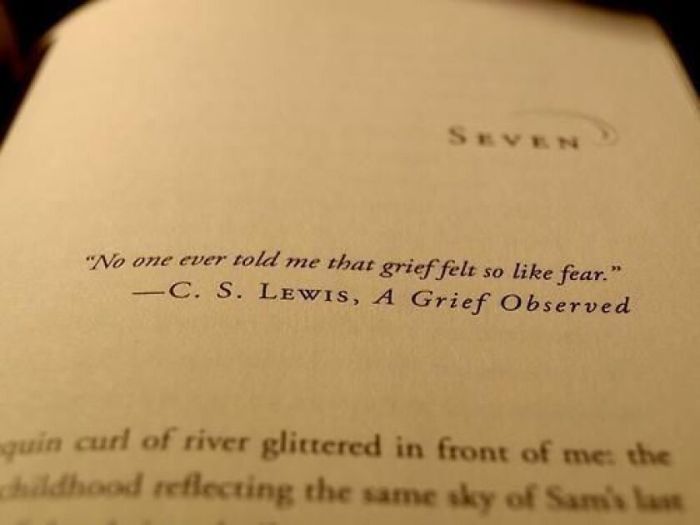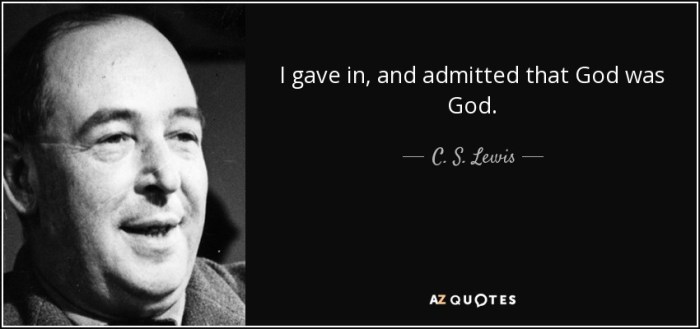Cs lewis a grief observed quotes – C.S. Lewis’s ‘A Grief Observed’ offers a poignant and profound exploration of grief, faith, and doubt. This collection of quotes from the book provides a glimpse into Lewis’s personal journey through loss and his search for meaning in the face of adversity.
Through his honest and introspective reflections, Lewis illuminates the complexities of grief, the challenges to faith, and the transformative power of doubt. These quotes offer solace, guidance, and inspiration to those who have experienced loss and are seeking to navigate the complexities of their own grief.
2. Key Themes in “A Grief Observed”

C.S. Lewis’s “A Grief Observed” is a deeply personal and moving exploration of the complex emotions and spiritual struggles that accompany the loss of a loved one. Through his own experiences with grief, Lewis offers profound insights into the nature of grief, faith, and doubt.
Grief
Lewis’s raw and honest portrayal of his grief is a central theme of the book. He vividly describes the intense pain, anger, and despair that follow the death of his wife. Through his words, Lewis allows readers to understand the overwhelming nature of grief and the challenges it presents to our sense of self and meaning.
Faith
Despite his profound grief, Lewis also grapples with his faith in God. He questions why a loving God would allow such suffering and loss. However, even in his darkest moments, Lewis clings to the hope that there is still meaning and purpose in life.
Doubt
Lewis’s struggle with faith also leads him to confront his doubts. He questions the existence of God, the afterlife, and the possibility of finding happiness after loss. Through his honest and introspective reflections, Lewis provides a unique perspective on the challenges of faith in the face of adversity.
3. Lewis’s Insights on Grief
In “A Grief Observed,” C.S. Lewis offers a unique and profound perspective on the nature of grief. He describes grief as a process that involves intense pain, confusion, and a sense of loss that can be overwhelming.
Lewis believed that grief has no set stages or duration. He writes, “No one ever told me that grief felt so like fear. I am not afraid, but the sensation is like being afraid. The same fluttering in the stomach, the same restlessness, the yawning.
I keep on swallowing.” This quote illustrates the intensity of grief and the way it can manifest physically.
Stages of Grief
While Lewis did not believe in a linear progression of grief, he did identify certain patterns in the grieving process. He writes, “The pain itself is like a physical thing—a weight that you carry inside you. It is a weight that you cannot put down.
It is a weight that you cannot share with anyone else.” This quote highlights the heavy and isolating nature of grief.
Duration of Grief, Cs lewis a grief observed quotes
Lewis also believed that grief is a process that can take a long time. He writes, “Grief is like a long valley, a winding valley where any bend may reveal a new landscape.” This quote suggests that grief is a journey that can be unpredictable and challenging.
Lewis’s Struggle with Faith
C.S. Lewis’s profound grief over the loss of his wife, Joy, profoundly challenged his faith. As a devout Christian, he had previously believed in a loving and benevolent God. However, the pain and suffering he experienced led him to question the existence of such a God.
God’s Silence
One of Lewis’s most poignant struggles was with God’s apparent silence during his grief. He writes, “If God is good and omnipotent, why does He allow such suffering? Why does He not intervene and ease my pain?” Lewis’s inability to find answers to these questions led him to doubt God’s existence.
“When you are happy, so happy that you have no sense of needing Him, so happy that you are tempted to feel His claims upon you as an interruption, if you remember nevertheless to offer Him the best of that happiness, and the gratitude recognizes His hand in its making, then perhaps that happiness, all that part of it which is not merely a gift but your offering back to Him, may be the most precious thing you give.”- C.S. Lewis, A Grief Observed
God’s Cruelty
As Lewis’s grief intensified, he began to see God as cruel and indifferent. He writes, “If God exists, then He must be either cruel or impotent. If He is cruel, then I cannot love Him. If He is impotent, then He cannot help me.”
Lewis’s anger and resentment towards God reached a peak as he grappled with the overwhelming pain of loss.
Evolution of Beliefs
Over time, Lewis’s beliefs evolved. While he never fully regained his previous faith, he came to a more nuanced understanding of God. He realized that God was not always the loving and benevolent figure he had imagined but could also be a source of pain and suffering.
Lewis’s experience of grief led him to a deeper and more complex understanding of the nature of faith.
5. The Role of Doubt in Lewis’s Journey: Cs Lewis A Grief Observed Quotes

Doubt played a pivotal role in Lewis’s grieving process, both challenging and ultimately strengthening his faith. In the depths of his grief, he grappled with profound questions about the existence and nature of God.
Lewis’s Struggle with Doubt
- He questioned the goodness of God, wondering why he had allowed his wife to suffer and die.
- He doubted the truth of Christianity, wondering if it was merely a comforting myth.
- He struggled to reconcile his belief in a loving God with the pain and suffering he witnessed in the world.
6. The Transformative Power of Grief

Lewis’s experience of grief profoundly transforms him, leading to a deeper understanding of life and faith. Through the pain and anguish, he gains a new perspective on the nature of suffering and the meaning of existence.
Specific Quotes
Lewis’s journey of transformation is evident in his writings, particularly in “A Grief Observed.” Here are some specific quotes that illustrate the transformative nature of his experience:
- “The pain now is part of my life and part of me. It’s not something I can push away or pretend isn’t there. It’s something I have to live with and learn from.”
- “Grief is like a long, dark night. But even in the darkest night, there are stars.”
- “God does not give us what we want, but what we need. And sometimes, what we need is to experience pain and suffering.”
7. Literary Analysis of “A Grief Observed”
Lewis’s writing in “A Grief Observed” is characterized by its raw honesty, profound insights, and evocative use of language. The book is structured as a series of journal entries written in the aftermath of his wife’s death, allowing readers to witness the author’s emotional journey in real-time.
Imagery, Metaphor, and Symbolism
Lewis employs vivid imagery to convey the physical and emotional pain of grief. He describes the “knife-edge of memory” and the “dark night of the soul.” Metaphors, such as comparing grief to a “beast” that “gnaws” at his heart, capture the intensity and relentless nature of his suffering.
Symbols, like the “shadow” that follows him, represent the enduring presence of his wife’s absence.
Emotional Conveyance
Lewis’s writing is remarkable for its ability to articulate the complex and often contradictory emotions of grief. He expresses both the despair and the hope, the anger and the love that coexist within him. Through his honest and vulnerable prose, Lewis allows readers to experience the full spectrum of emotions associated with loss.
8. Impact and Legacy of “A Grief Observed”
C.S. Lewis’s “A Grief Observed” has had a profound impact on readers since its publication in 1961. The book’s raw and honest exploration of grief has resonated with countless individuals who have experienced loss.
One of the key reasons for the book’s enduring relevance is its ability to articulate the often-contradictory and confusing emotions that accompany grief. Lewis’s writing captures the pain, anger, and despair that can accompany loss, while also offering a glimmer of hope and the possibility of healing.
Testimonials
- In a review for The New York Times, Christopher Lehmann-Haupt wrote, “It is a book that will comfort those who grieve, and it will make those who have never grieved understand something of what grief is like.”
- In a letter to Lewis, a reader wrote, “Your book has been a great comfort to me in my own grief. It has helped me to understand my own feelings and to know that I am not alone.”
- In a blog post, a grief counselor wrote, “A Grief Observed is a must-read for anyone who has experienced loss. It is a powerful and moving book that offers insights and comfort to those who are struggling with grief.”
Questions and Answers
What is the main theme of ‘A Grief Observed’?
The main theme of ‘A Grief Observed’ is the exploration of grief, faith, and doubt in the wake of personal loss.
How does Lewis’s personal experience shape his insights on grief?
Lewis’s own experience of losing his wife, Joy Davidman, deeply informs his insights on the nature of grief and its impact on faith.
What is the significance of doubt in Lewis’s journey?
Doubt plays a crucial role in Lewis’s journey, as it challenges his faith and ultimately leads to a deeper understanding of his beliefs.